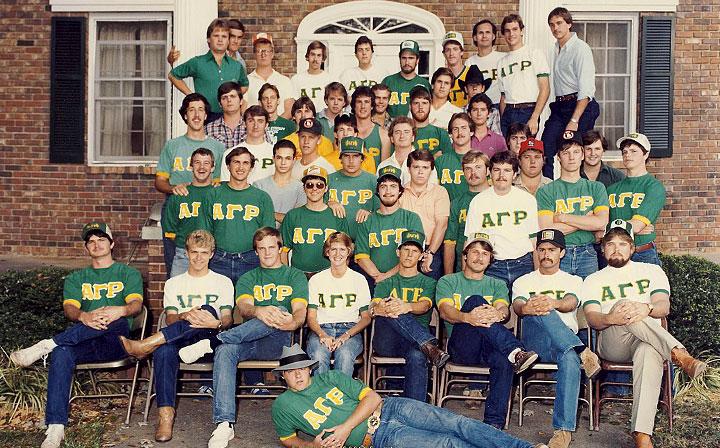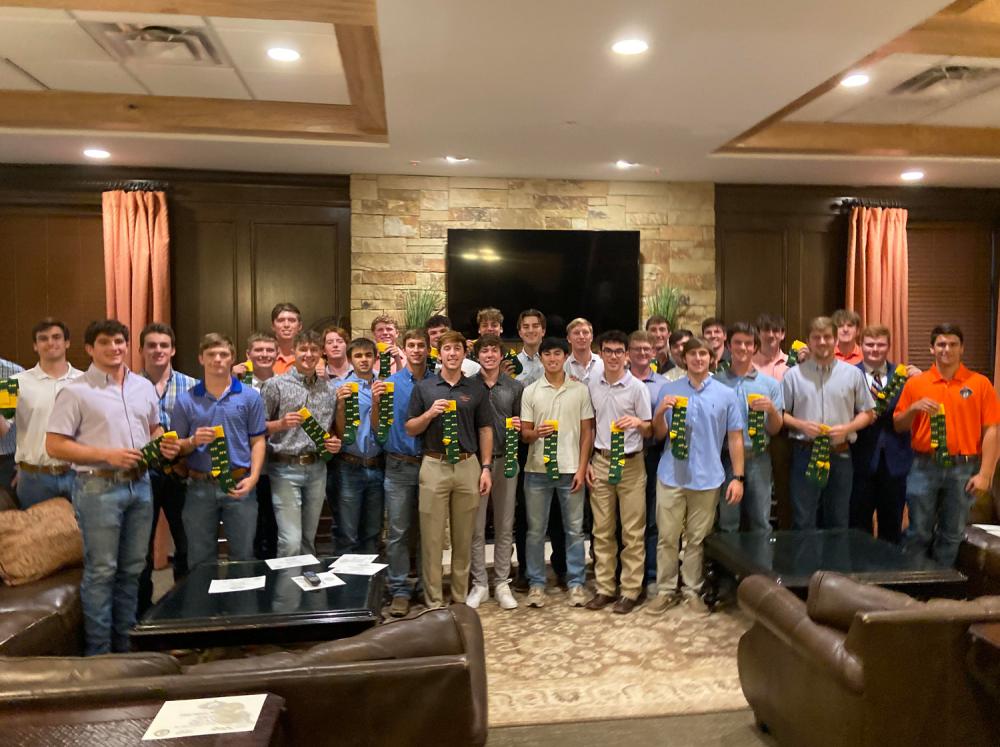Story by Matt Olson
IT’S THE CALL NOBODY wants to receive. A phone call to let you know a loved one has passed away. And then your heart sinks when you find out they committed suicide. That’s the call Wanda Gryszkiewicz’s received when she found out her 21-year-old son, Mitchell Gryszkiewicz, committed suicide in 2014 when he was a student at the University of Maryland and member of AGR.
The stigma surrounding mental health often prevents people from seeking and getting the help they need. Mental health in America is at crisis levels with more than 47,000 Americans dying by suicide in 2017, the tenth leading cause of death in the U.S. for that year. Amidst the mental health crisis, men are 3.5 times more likely to die by suicide, and white males accounted for nearly 70 percent of the suicide deaths in 20171 . And those in rural America are at a higher risk for suicide—approximately 25 percent higher than urban communities2—while college students face unprecedented rates of mental health issues. Mental health encompasses more than preventing suicide. Maintaining mental health includes addressing conditions such as depression, anxiety, post-traumatic stress disorder and other conditions affecting emotions, thinking and behavior.
THE ALARMING MENTAL HEALTH CRISIS IN RURAL AMERICA
In recent years, U.S. farmers have experienced falling crop and milk prices, rising tariffs and weather-related disasters. All of this leads rural families to struggle to make ends meet. Financial problems on the farm and isolation in rural areas often lead to mental health concerns.
“After four or five years of this, you can imagine the level of stress is significant,” says Jordan Treakle, of the National Farm Coalition. “And suddenly, despite how much you are able to work—and put all your effort into that production—you’re not able to buy your groceries. You’re having to choose between your medicine and school fees.”3
For some farmers, there is great pride in operating the family farmstead and running the family business passed down from generation to generation. For some, losing the farm can mean they are losing their identity and livelihood.
U.S. farmers have one of the highest suicide rates of any profession, dying at nearly twice the rate of the general population. Yet farmers are often perceived as the rugged and tough men who are stoic and don’t express much emotion. More often than not, they’ve been taught not to complain or talk about their feelings. However, this determination to uphold rugged masculinity may be what is fueling the mental health crisis in rural America.
In rural communities, many farmers are involved and serve important roles on their local school boards, fire departments, church councils and various other organizations. They are typically some of the first to step up and help others, and yet, they are usually the last to ask for help. As brothers in AGR, we’re taught to look out for our neighbors and to offer help because we can only be as strong as the communities we are part of.
Our purpose as AGR members is to “Make Better Men,” but if we are not honest with ourselves about our health—which includes mental health—are we truly able to become the better men we strive to be? Talking about emotions, feelings, concerns and challenges is not a sign of weakness—it’s actually a sign of strength. But talking about these things goes against our understanding of what masculinity is, so perhaps it’s time to redefine masculinity.
Open Conversations: Making Better Men
Rural Americans are not the only group with an increased rate of mental health conditions. College students are likely now more than ever to experience overwhelming anxiety, depression, stress and suicidal ideation. Suicide is the second leading cause of death for college students. This is a reality that Michael Wijesinghe knows all too well.
“We are trying to bring light to the shadows,” Michael said when discussing mental health. “We make it a point to check in and ask each other, ‘How are you doing?’” Wijesinghe, 2018 Noble Ruler of the Alpha Theta Chapter, and his brothers at the University of Maryland regularly check in with each other on mental health. This has become a priority since they lost one of their own, Mitchell Gryszkiewicz, in 2014 to suicide.
“We keep an opendoor policy,” Michael said. “Anybody can talk to anybody about anything they need to because we’re all here for each other.” The chapter has recognized that supporting each other by being open about how they feel is important to the health and well-being of every man in the Fraternity.
The Alpha Theta Chapter has grown closer and stronger in the years since Mitchell’s suicide. United in a common cause to end the stigma of mental health, the chapter has organized and participated in events to raise awareness of mental health including a hog roast barbeque, an Out of the Darkness Walk and, most recently, the “Alpha Gamma Rhodeo.”
The Out of the Darkness Walk in partnership with the American Foundation for Suicide Prevention focuses on bringing awareness and normalcy to the topic of mental health to change our culture’s taboo on mental health. Each year more than 150 campuses hold walks for the cause. In 2017, the University of Maryland Out of the Darkness Walk raised more than $26,000 with over 350 participants. Wanda Gryszkiewicz, Mitchell’s mother, was one of those walkers.
“Being strong and not asking for help is a behavior we teach our children,” said Wanda Gryszkiewicz. “Young men are taught to be strong all of the time, but even the strongest person has that moment where they need help. Everybody needs somebody.”
Since losing her son, Wanda’s mission has been to raise awareness around mental health and let young adults and students know it is okay to not be okay. “These young men never cease to amaze me,” Wanda said when talking about the Alpha Theta Chapter’s efforts to raise awareness of mental health on campus. “There is a lot to balance as a college student. And oftentimes, schools and campuses need more resources and better access for mental health.”
Redefining Masculinity
Too often, masculinity becomes a mask worn to bury emotions, feelings and the hurting that men actually experience. Redefining masculinity is one way to help end the stigma of mental health in men.
“Our current definition of masculinity is very limited, and it’s that limited understanding of what it is to be male that may lead us to aggression,” said Hector Torres PsyD, director for the Center for Mental Health at the Chicago School of Professional Psychology, in a post on the American Psychological Association website.4 A lot of men struggle to admit they may have mental health issues because they view it as a sign of weakness or a lack of personal fortitude. Because of the pressure to always be strong, many men don’t ask for the help they need.
As we live into the full Purpose of “Making Better Men,” perhaps we need to consider opening up and receiving support from our family, friends, brothers and communities to become better men. By reframing the perception that asking for help is a sign of strength and not weakness, we can access the resources and help we need to be healthy.
Starting conversations about the challenges we face and the impact on how we feel is an important step to ending the stigma of mental health. Talk to your family, friends and neighbors about the stressors in your life.
Your Role In Ending The Stigma
If you’re a sales rep or consultant who makes visits to farms, you are in a good position to ask your clients how they are and to truly engage in conversations that can impact mental health. Discussions can be as simple as talking about the stressors for the farm or asking about how things are going on a personal level. People want and need to know that others care about them.
If you are a farmer, rancher, producer or someone living in rural America, talk with your family and neighbors about mental health. Be open and honest. Commit to each other that if you’re ever approaching or in a mental health crisis, you’ll let each other know. Making this promise can be a first and powerful step towards building a support network for when times are tough.
If you are a college student, chapter officer or adviser, make it a point to ask your brothers, “How are you doing? Do you need to talk?” Developing a relationship and earnestly checking in could allow someone the opportunity to open up about their struggles and ask for help.
How Alpha Gamma Rho Is Stepping Up
As a National Fraternity, it was realized that, while we coach chapters to use all the resources available on their campus, AGR did not have any readily available tools to help our members have conversations around mental health.
We know that college life, classroom expectations and campus involvement causes stress, anxiety and even depression for many students. Again, if we expect all members to live out the Purpose and Principles of Alpha Gamma Rho, the Fraternity needed to provide brothers with the ability to know how to start these initial conversations with each other.
Through AGR’s partnership with Plaid, a company focused on personal and professional growth through hands-on learning, all members, collegiate and alumni, have access to an entirely new risk management series conveniently located within AGRconnect.
Through the mental health module, you can learn about common issues, how to recognize mental health issues within yourself and those around you, and provides resources for dealing with these potential issues. Making Better Men is as much a collective effort as it is an individual endeavor, and if AGR is to be a brotherhood, our members need to know it is okay to talk with one another about how their day is going, how we can help each other, and know there are resources to take advantage of when necessary.






